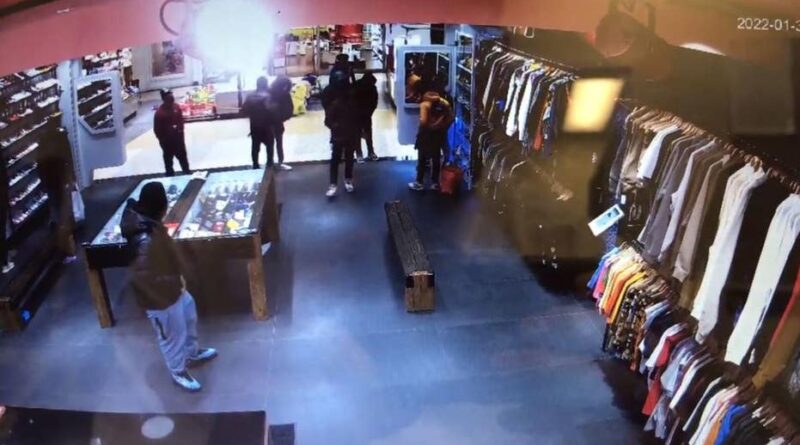What Biden can and cannot do about crime in America's cities
Dramatic footage shows moment teen opens fire in crowded New York City mall
Three teens, Timothy Briggs, Jaheim Covington and Omarion Harvey, were arrested in connection to the shooting that wounded two.
It’s too bad President Joe Biden is meeting with the wrong guy when he comes to New York City Thursday.
No, no. Don’t get me wrong. It is a good thing for the Big Apple that its newly installed Democratic mayor, Eric Adams, has a good relationship with the president – his party’s leader, and a potential source of meaningful federal help to a city experiencing a troubling surge of violent crime.
Yet, while Mayor Adams wields considerable influence over how the five boroughs are policed, he has precious little over the most consequential aspect of law-enforcement: the prosecution of offenses.
National media coverage tends to be Washington-centric. We thus get used to the federal system and assume that’s how government works, with all executive power reposed in the president (the chief executive). Since law-enforcement powers are executive in nature, presidents get to appoint top federal officials, such as the attorney general and the FBI director. If they decline to enforce the laws, and the nation thereby experiences rising crime, the president can fire them immediately. In that situation, a president would have a deep interest in terminating these subordinates: As the elected official accountable to voters, it is the president who pays a steep political price if the nation is imperiled because of lax enforcement.
That, however, is not how state and municipal government work.
In New York, as in most states, the chief prosecutors in a jurisdiction – i.e., the district attorneys and county attorneys – are elected offices. They are not appointed by the mayor of their municipality, or even by the state’s governor. The mayor of New York City, in particular, has no authority over the district attorneys in the five boroughs. This governing framework can lead to dysfunction.
The mayor is responsible for appointing the city’s police commissioner. In his most significant early move, Mayor Adams named veteran cop Keechant Sewell, the former chief of detectives for Nassau County, as the NYPD’s first African-American police commissioner. Adams, also a former cop, separated himself from his woke-progressive competitors in the Democratic mayoral by promising to crack down on urban violence. This approach resonated even with voters in a blue, blue city where gang crime is raging. Murders – there were 485 last year – have nearly doubled since the low ebb in 2017. Though we’re still not in the bad old days – in 1990, for example, there were 2,245 murders in the Big Apple – the trend is alarming.
Even more alarming is the prosecution end of law-enforcement. The progressive Democrats who run New York have been on what they perversely call a criminal justice “reform” crusade. Turns out reform is just a euphemism for anti-law-enforcement policies.
On the front end of crime, bail “reform” has prevented judges from detaining dangerous criminals who should be in custody. Perhaps worse, progressive prosecutors – such as Manhattan’s recently elected DA Alvin Bragg – are distorting the concept of prosecutorial discretion as if it were a doctrine of non-prosecution.
The police can aggressively make arrests at the urging of the mayor and the commissioner. But it is up to the district attorneys to decide which cases are worth pursuing, what charges to bring, and what offenses merit non-incarceration treatment or outright dismissal. If the woke district attorneys won’t prosecute, police realize it is pointless to make arrests.
Moreover, if the DAs, by applying progressive-prosecutor dogma, decide that what really needs investigating is the police, not the criminals, the cops gradually become less visible, even as crime climbs. When a police officer comes to believe that, if he has to subdue a violent criminal, it is more likely that the cop will be accused of assault than that the criminal will be charged with a serious crime, then the rule of law withers and dies.
In the state’s system, the governor has power to remove derelict prosecutors. Here again, though, New York politics plays an insidious role. Governor Kathy Hochul, who replaced the disgraced Andrew Cuomo late last year, wants to be elected to her own four-year term later this year. Progressives are the locus of the Democratic Party’s passion and much of its financial heft. Progressives support the prosecutors’ soft-on-crime policies. It does not appear that Hochul has the nerve that Adams showed for swimming against that tide.
And therein lies the elephant in the room as the president meets with the mayor. While Joe Biden was a tough-on-crime Democrat in the nineties when that was the way the wind was blowing, he has been captured by progressive ideologues as president. In the end, the federal government can provide some resources to besieged cities, but even when the feds are philosophically pro-law-enforcement (as Trump’s Justice Department was), they can’t save a city that declines to save itself.
President Biden may talk a good game when he meets Mayor Adams on Thursday. After all, New Yorkers are seething over a career criminal’s brutal murders of NYPD officers Jason Rivera and Wilbert Mora in Harlem, in addition to other attacks on cops. Neither Biden nor his Justice Department, however, have shown an inclination to do anything other than march in lockstep with the woke Left and its progressive prosecutors. Unless this president, who has shown no appetite for confronting his party’s extremists, suddenly has a change of heart, he might as well have stayed home.
Source: Read Full Article







